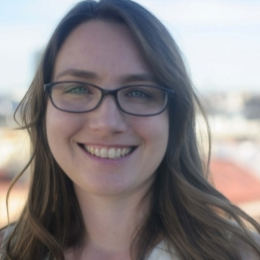For two years, the Graduate Division and the College of Creative Studies invited pairs of graduate students to submit a proposal to teach an undergraduate course to be offered in the College of Creative Studies (CCS). The course had to be built around a social justice or environmental justice theme, taught by two graduate students coming from different fields (i.e. distinguishable disciplinary epistemologies). In 2021-2022, MacKenzie Wade (Anthropology) and Mariah Miller (Global Studies), taught the course, “Alternative Foods, Alternative Economies: Creative Collaborations to Reimagine the Food System.” Stephen Borunda (Film and Media Studies) and Surojit Kayal (English), in 2022-2023, taught “Deserts, Islands, and Other Energy Infrastructures.”
In the News
A Winning Proposal
The UCSB Current
July 9, 2021

"Crossroads 2.0 is a unique opportunity for Ph.D. students to engage in an interdisciplinary project, develop and teach a course with mentorship and generous resources and learn by teaching. These activities are all key parts of an academic career that are usually left out of the training for Ph.D. students. Academic research is often conducted in interdisciplinary teams, but almost all work as a Ph.D. student is conducted alone, especially in the social sciences. Most professors design and teach courses, but few Ph.D. students get the opportunity to teach a course at all, let alone one that brings their own research into the classroom. I believe that participating in the program will be very rewarding personally and professionally and will make me much better prepared for the academic job market.”
Mariah Miller
Awardee, Crossroads 2.0 Proposal Competition
PhD Student
Global Studies
Crossroads 2.0
An Interdisciplinary Research-and-Teaching Experience
The Graduate Division and the College of Creative Studies invited pairs of graduate students to submit a proposal to teach an undergraduate course to be offered in the College of Creative Studies (CCS) during the 2022-23 academic year. The course was built around a social justice or environmental justice theme, and was taught by two graduate students coming from different fields (i.e. distinguishable disciplinary epistemologies). MacKenzie Wade (Anthropology) and Mariah Miller (Global Studies), winners of the first Crossroads 2.0 competition, taught course, “Alternative Foods, Alternative Economies: Creative Collaborations to Reimagine the Food System,” during the winter 2023 quarter.
We encouraged interested students to enroll in GRAD 210 (taught spring quarter by Dr. Lisa Berry and Dr. Josh Kuntzman) as an opportunity to develop an idea for such a course. GRAD 210: College and University Teaching: From Theory to Practice, engages with strategies for applying pedagogical theories and evidence-based teaching to course design, implementation, assessment, and evaluation, and is offered spring quarter.
In CCS, the goal is to offer an educational experience that presents students with opportunities to discover how their own disciplinary knowledge can come together in generative ways with that of other disciplines around an important issue. CCS already offers incredible opportunities for undergraduates to explore a specific discipline deeply; this course would provide one opportunity for them to work on thinking across disciplines.
The students selected for Crossroads 2.0 were provided:
- a stipend of $2,500 each for Summer 2022 to begin working on the course
- a second stipend of $2,500 each for Fall 2022 to finalize the syllabus
- or GSR position in their department
- an Associate position each to teach the course in Winter 2023
To apply for Crossroads 2.0, pairs of students submitted a 3-5 page description of the course concept (specifying the social or environmental justice theme, interdisciplinary approaches, and a plan for developing the course) and a c.v. for each student.